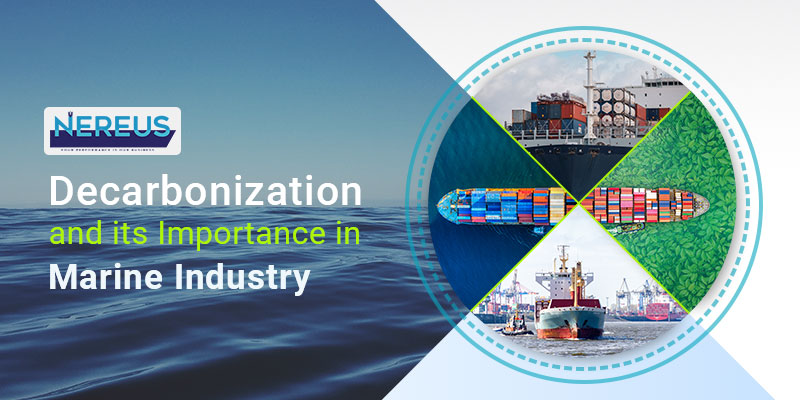The marine industry is an enormously significant part of global trade, considering how various goods are transported by sea. In this scenario, there have been tremendous amounts of dialogue on the importance of decarbonizing the marine industry. Currently, shipping represents a major portion of the global greenhouse gas emission and it is up to the industry to start decarbonizing and limit the air pollution on the planet. Global governments are also being prompted to take steps to promote decarbonization for which new laws and regulations are expected the revolutionize the nature of the industry.
Decarbonization can be led by a change in the fuel used by the marine industry. For instance, if ships begin using fuel such as liquefied natural gas or biofuels or nuclear power options, decarbonization can be reduced to a significant degree. However, there are barriers to the use of such alternative fuels and these include issues such as prohibitive cost, lack of resources, or social acceptance. Decarbonization can also be driven through efficiency improvements in the ship as these would lead to lower use of fuel. This can be ensured through regular maintenance, hull cleaning, as well as changes in the design of the hull and propellers.
While decarbonization has been a topic of discussion over the last few years, it is becoming increasingly important to focus on environment-friendly and sustainable solutions as well as the fact that the demand for shipping is likely to increase, on a global scale. Given this strong focus, many marine companies in UAE and countries empowered by the marine industry are making decarbonization an intrinsic part of their policies and business strategies. In fact, the International Maritime Organization has set an ambitious target of reducing carbon emissions caused by shipping to 50% of the level in 2008, by 2050.
Possible Steps for Decarbonization
It is not enough for the industry to just focus on decarbonization. Strong and decisive action needs to be taken, in terms of regulations as well as financial incentives, to prompt the industry to fulfil the decarbonization vision. It is true that the global industry is discussing deep decarbonization and is keen to support sustainability through lowered carbon emissions but, as one of the oldest industries on the planet, with a legacy system in place, it is difficult to affect sudden and over-reaching change. The transformation needs to be slow yet steady, with incentives in place to support the industry in adopting future-ready alternatives to carbonized fuels. In this regard, the IMO introduced measures for both new and old ships, combining operational and technical measures aimed at reducing emissions significantly.
Solutions are necessary for a number of aspects, from the price of alternative fuel options to the difficulty of storing the same. As ships remain in water over long periods, they need to carry fuel on board, and it is difficult to store fuel options like gas. The industry needs to work in tandem with the government, and research facilities, to create alternative fuel options which are both cost-effective and easy to use. It is only through the rise of socially acceptable and easy-to-use fuel choices that actual decarbonization will be possible in a sustainable and long-term manner.
Nereus Subsea , the best ship repair company in Singapore offers the best underwater services in UAE .
Alternatives at Hand
Considering the difficulty in storing and using fuel, as well as the price and non-renewable nature of LPG as an alternative, the industry is considering biofuel as a suitable replacement for the current fuel variants. Accordingly, the industry is striving to develop fuel options leveraging renewable energy sources, such as wind energy, solar energy, and biomass. Another possible option is fuel cells with green hydrogen or green ammonia as these eliminate emissions as well as pollutants.
The industry can also try CO2 abatement options or strategies and techniques aimed at limiting fuel consumption. These include options such as slow steaming, vessel and propeller design, waste heat recovery and optimal cleaning and coating of the hull’s surface as these methods are proven to lower fuel consumption. This happens because these steps help reduce the ship’s resistance, enhance propulsion and help use wasted heat energy produced by the ship’s engine. However, further research and long-term adoption are required to verify the potential inherent in these options.
Overall, we can look forward to a decarbonized marine industry only through focused steps such as social pressure, financial perks, and major regulatory and legislative changes reforms that are made on a local, regional and international scale as the industry needs to change as a whole. The shipping industry needs to unite, globally, to ensure decarbonization and environmental sustainability.
Nereus Subsea is the preeminent provider of hull cleaning services in Singapore, UAE, Malaysia, and Sri Lanka. By offering our clients the highest quality hull cleaning services available on the market, our reputation is second to none. Nereus Subsea is proud to be able to deliver top-tier quality hull cleaning services that exceed the expectations of our clients and keep their vessels in peak condition. Being an SME500 award-winning and fast-paced underwater cleaning company Nereus Subsea is the unrivalled pioneer in hull cleaning.

